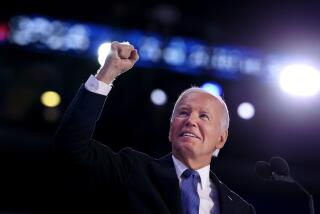Biden’s speech on voting rights was a sermon, not a battle plan

- Share via
In his speech about voting rights on Tuesday, President Biden told the audience at the National Constitution Center in Philadelphia that he wasn’t “preaching to you.” But that was false humility. Biden’s speech was very much a sermon, and an effective one, about the importance of defeating an assault on democracy.
What the speech wasn’t was a new battle plan for countering efforts by Republican state legislatures to make it harder for Americans — especially voters of color — to exercise the franchise.
Yes, Biden called for enactment of the gargantuan For the People Act, which passed the Democratic-controlled House and is stalled in the Senate, as well as the John Lewis Voting Rights Advancement Act. He also urged Congress to counter a Supreme Court decision earlier this month that narrowed the protections of what was left of the Voting Rights Act after the court gutted a key provision in 2013.
But as Biden surely knows, the original For the People Act is a dead letter. It isn’t just that Senate Republicans used the filibuster last month to prevent even a debate on the legislation. As the price for voting with the rest of his party on that procedural vote, Sen. Joe Manchin (D-W.Va.) apparently got assurances that if debate ever did commence, the focus would shift to his narrower proposal, one that accepts the idea of voter ID requirements.
If, as seems likely, Republicans continue their stonewalling regardless of Democrats’ willingness to compromise, Biden might then propose abolishing the filibuster — or at least suspending it for election-related legislation.
Biden didn’t take that position in Tuesday’s speech, disappointing civil rights activists. But that doesn’t mean the speech was a waste of time.
The president effectively communicated the urgency of the threat to elections posed by the big lie that former President Trump won the 2020 election and the subsequent (and related) state efforts to make it harder to vote and to give legislators more sway over election outcomes. The speech was marked by such a sense of exasperation at what Biden called “election subversion” that it could have been headlined “Come on, man!”
The most hopeful gloss on the president’s speech was that it was an overture to the sort of dealmaking that resulted in a bipartisan agreement on an infrastructure bill. In the speech Biden shamed Republicans who have enabled Trump’s big lie; now he must find a way either to work with them or render them irrelevant.
More to Read
A cure for the common opinion
Get thought-provoking perspectives with our weekly newsletter.
You may occasionally receive promotional content from the Los Angeles Times.










